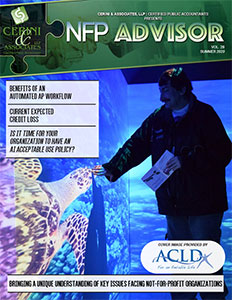As Artificial Intelligence (AI) continues to dominate the tech news, many individuals and organizations are utilizing AI systems to create content, automate processes, and increase their productivity. However, few (if any!) organizations have bothered to establish guidelines to ensure the responsible and ethical use of AI technology. I will argue that nonprofits are making a double mistake here:
- Missing out on opportunities for successful AI adoption
- Inadvertently courting significant risks by not having an AI policy in place.
AI has the potential to bring unimaginable benefits, but also comes with inherent risks. AI-generated outputs may be subject to bias, inaccuracies, and misuse, both intentional and unintentional. Therefore, it is crucial for organizations to establish clear policies for AI usage to address these concerns and ensure alignment with their mission, values, and objectives.
By providing guidelines for ethical and mission-aligned use, data protection and privacy, as well as promoting transparency and accountability, an AI Acceptable Use Policy helps to build trust among staff, volunteers, contractors, and external stakeholders. Furthermore, it encourages the development of training and awareness programs to ensure that all individuals who use AI systems on behalf of the organization are well-equipped to do so responsibly and ethically.
Risks of Not Implementing an AI Acceptable Use Policy
In the absence of a clear AI Acceptable Use Policy, organizations may face significant risks, including legal, financial, and reputational consequences. For instance, unintentional misuse of AI tools could result in the exposure of sensitive information or the dissemination of misleading or even offensive content.
Here are some potential risks associated with not having an AI Acceptable Use Policy:
1.) Data Mishandling and Privacy Concerns
Nonprofits often deal with sensitive data concerning their donors, beneficiaries, and stakeholders. AI systems rely on vast datasets to learn and improve, making them more susceptible to potential data breaches or misuse. Without a clear AI Acceptable Use Policy, employees may inadvertently mishandle data or use AI algorithms without proper understanding, leading to data leaks and privacy violations.
One recent example of this happened at Samsung. Such incidents can not only damage the reputation of the nonprofit but also result in legal consequences and loss of trust from donors and stakeholders.
2.) Bias and Discrimination
AI algorithms are only as unbiased as the data they are trained on. If the training data contains inherent biases, the AI system will perpetuate them, potentially leading to discriminatory practices. For example, an AI-driven recruitment tool could unknowingly favor certain demographic groups, leading to an unfair and non-inclusive hiring process. An AI Acceptable Use Policy helps nonprofits ensure that the AI systems are designed and used in a way that mitigates bias and promotes diversity and inclusion.
3.) Unintended Consequences
AI is a powerful tool, but it is not without limitations. Relying blindly on AI-generated insights without human oversight can lead to unintended consequences. Nonprofits must carefully consider the context of AI recommendations and decisions before implementing them. An AI Acceptable Use Policy can mandate human review and intervention before making critical decisions, ensuring that the technology remains a supportive tool rather than a substitute for human judgment.
4.) Financial and Resource Mismanagement
Implementing AI systems can be a significant investment for nonprofit organizations. Without an AI Acceptable Use Policy in place, there is a risk of misallocation of resources or overspending on AI initiatives that may not align with the organization’s mission. A clear policy ensures that AI projects are evaluated against strategic objectives, maximizing the impact of the organization’s budget and efforts.
5.) Lack of Transparency and Accountability
AI algorithms can be complex, and their inner workings are often difficult to understand, even for experts. Nonprofit organizations must ensure transparency in their AI systems to maintain trust with their stakeholders. An AI Acceptable Use Policy should outline the responsibilities and accountability of employees and the organization when using AI. This includes regular audits and reporting on the performance and impact of AI systems.
So what now?
The adoption of AI technology is happening NOW and organizations can no longer afford to ignore the opportunities and risks associated with this rapidly advancing technology. An AI Acceptable Use Policy is a vital tool for organizations to ensure the responsible and ethical use of AI systems while minimizing potential harm.
I feel so strongly about the importance of this that I have taken the time to draft (with the help of AI, of course) a sample AI Acceptable Use Policy that I am making available here.


